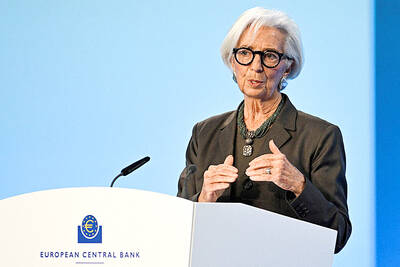Taiwan is targeting a 25-fold increase in biodiesel use in the next three years to cut reliance on energy imports and reduce emissions of harmful gases, a government official said yesterday.
Biodiesel use may rise to 100,000 kiloliter or 630,000 barrels in 2010, from an estimated 4,000 kiloliters this year, Yeh Huey-ching (
Energy from the nation's own resources, mostly hydropower and natural gas, accounts for just 1.8 percent of supplies. Taiwan will use soybeans, sunflower seeds and recycled cooking oil to make biodiesel and turn sweet potatoes and corn into ethanol, Yeh said yesterday.
"We are developing clean and alternative energy sources," Yeh said.
The biofuels plan may contribute to Taiwan eventually meeting as much as 8 percent of its own energy needs, he said, without giving a timeframe.
Lawmakers must approve the proposal, which requires a change to the Petroleum Management Law (
Biodiesel use last year was restricted to "a few hundred kiloliters" consumed mostly by garbage removal trucks. Consumption of ethanol for transportation may rise to 100,000 kiloliters in 2011, from zero now, he said.
The project needs the support of state-run CPC Corp, Taiwan (台灣中油) and Formosa Petrochemical Corp (台塑石化), the nation's two oil refiners. CPC will start selling diesel with 1 percent biofuel content at 82 gasoline stations later this month.
Starting September, eight CPC-run service stations will sell gasoline containing 3 percent ethanol and government departments will be encouraged to use the fuel, Yeh said.
Buses in Kaohsiung have been running on fuel that contains 2 percent biodiesel since January, he said.
Thirty-five lines and 79 buses in Chiayi County have started using fuel that contains 5 percent biodiesel since this month, Yeh said. Starting July 27, gas stations in Taoyuan and Chiayi counties will provide fuel containing 1 percent biodiesel to consumers, he said.
Taiwan had 2,615 gasoline stations as of last month, according to the energy bureau. Diesel demand totaled 6.3 million kiloliters last year, while 10.3 million kiloliters of gasoline was used.
Requiring all filling stations to sell biodiesel will mark a "revolutionary step" for Taiwan, Yeh said.
Biodiesel costs NT$53 (US$1.6) a liter, according to the energy bureau. That's more than double the NT$25.8 CPC charges for its premium diesel at filling stations.
Additional reporting by Jessie Ho

European Central Bank (ECB) President Christine Lagarde is expected to step down from her role before her eight-year term ends in October next year, the Financial Times reported. Lagarde wants to leave before the French presidential election in April next year, which would allow French President Emmanuel Macron and German Chancellor Friedrich Merz to find her replacement together, the report said, citing an unidentified person familiar with her thoughts on the matter. It is not clear yet when she might exit, the report said. “President Lagarde is totally focused on her mission and has not taken any decision regarding the end of

French President Emmanuel Macron told a global artificial intelligence (AI) summit in India yesterday he was determined to ensure safe oversight of the fast-evolving technology. The EU has led the way for global regulation with its Artificial Intelligence Act, which was adopted in 2024 and is coming into force in phases. “We are determined to continue to shape the rules of the game... with our allies such as India,” Macron said in New Delhi. “Europe is not blindly focused on regulation — Europe is a space for innovation and investment, but it is a safe space.” The AI Impact Summit is the fourth

Australian singer Kylie Minogue says “nothing compares” to performing live, but becoming an international wine magnate in under six years has been quite a thrill for the Spinning Around star. Minogue launched her first own-label wine in 2020 in partnership with celebrity drinks expert Paul Schaafsma, starting with a basic rose but quickly expanding to include sparkling, no-alcohol and premium rose offerings. The actress and singer has since wracked up sales of around 25 million bottles, with her carefully branded products pitched at low-to mid-range prices in dozens of countries. Britain, Australia and the United States are the biggest markets. “Nothing compares to performing

AUSPICIOUS TIMING: Ostensibly looking to spike the guns of domestic rivals, ByteDance launched the upgrade to coincide with the Lunar New Year China’s ByteDance Ltd (字節跳動) has rolled out its Doubao 2.0 model, an upgrade of the country’s most widely used artificial-intelligence (AI) app, the company announced on Saturday. ByteDance is one of several Chinese firms hoping to generate overseas and domestic buzz around its new AI models during the Lunar New Year holiday, which began yesterday, when hundreds of millions of Chinese partake in family gatherings in their hometowns. The company, like rival Alibaba Group Holding Ltd (阿里巴巴), was caught off-guard by DeepSeek’s (深度求索) meteoric rise to global fame during last year’s Spring Festival, when Silicon Valley and investors worldwide were